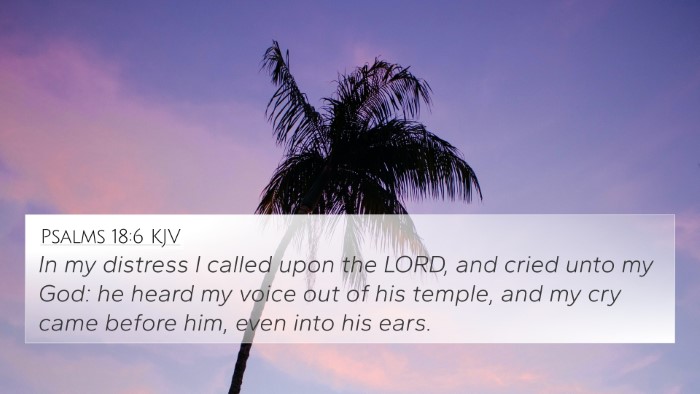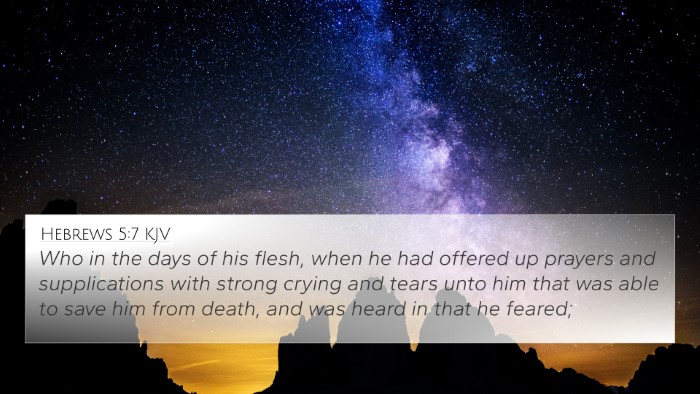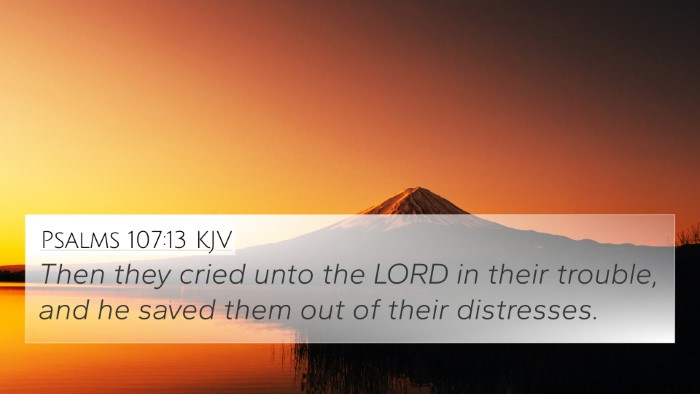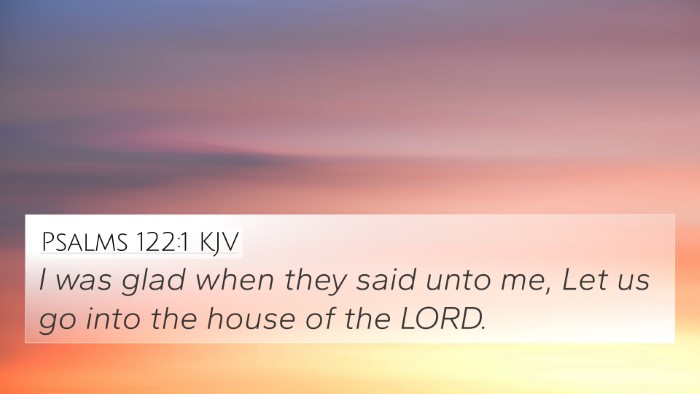Psalms 120:1 - Understanding the Verse
Bible Verse: Psalms 120:1 - "In my distress, I cried unto the Lord, and he heard me."
This verse expresses a deep sense of urgency and reliance on God amidst distress. The psalmist reveals the heart of a believer who turns to God in times of trouble, signifying a profound relationship based on trust and faith.
Summary of Biblical Meaning from Public Domain Commentaries
Matthew Henry's Concise Commentary
Henry notes that this psalm is a cry for help in times of trouble. The psalmist acknowledges his affliction and reflects on the faithfulness of God in hearing prayers. It serves as a reminder that during our hardships, turning to God assures us of His presence and support.
Albert Barnes' Notes on the Bible
Barnes emphasizes the motif of distress and the nature of God as a responsive being. The act of crying out indicates not only desperation but also a belief in God’s attentiveness. This connection showcases the intimate relationship between the believer and God, where faith leads to divine intervention.
Adam Clarke's Commentary
Clarke elaborates on the circumstances that might lead to such distress, suggesting that the external situation can often drive an internal plea. He highlights the importance of vocalizing distress to God, showing that acknowledgment of our vulnerability brings us closer to divine help.
Key Insights from Psalms 120:1
- Distress: The psalmist begins with an acknowledgment of their state of affliction.
- Crying to the Lord: This signifies not only desperation but also faith in God's ability to intervene.
- He Heard Me: It emphasizes God's responsiveness and the assurance that believers have in approaching Him with their troubles.
- Theme of Prayer: This verse underscores the power of prayer and communication with God during times of trouble.
Bible Verse Cross-References
The following cross-references connect to the themes in Psalms 120:1, showcasing the interconnectedness of scriptures and how they support and reinforce the concepts of distress and divine help:
- Psalms 34:17: "The righteous cry, and the Lord hears, and delivers them out of all their troubles."
- Psalms 50:15: "And call upon me in the day of trouble: I will deliver thee, and thou shalt glorify me."
- Psalms 55:16: "As for me, I will call upon God; and the Lord shall save me."
- Psalms 86:7: "In the day of my trouble I will call upon you, for you will answer me."
- Isaiah 40:31: "But they that wait upon the Lord shall renew their strength; they shall mount up with wings as eagles; they shall run, and not be weary; and they shall walk, and not faint."
- Matthew 11:28: "Come unto me, all ye that labor and are heavy laden, and I will give you rest."
- James 5:13: "Is any among you afflicted? let him pray."
Thematic Connections
This verse not only speaks of personal distress but opens up a broader thematic dialogue within the scriptures about seeking God in hardship. By linking this verse to others that discuss divine support in troubling times, we can observe a cohesive narrative that runs through the Bible.
Tools for Bible Cross-Referencing
To explore the connections between Bible verses, one can use various tools and resources:
- Bible Concordance: A tool to find where a particular word or phrase appears in the scripture.
- Bible Cross-Reference Guide: Publications that list related verses and themes for deeper study.
- Bible Chain References: Systems that connect verses related to specific themes or topics.
- Cross-Referencing Bible Study Methods: Techniques to analyze and connect passages across the entire Bible.
Conclusion
Psalms 120:1 serves as a powerful reminder of the importance of reaching out to God in times of distress. This verse, along with its inter-Biblical connections, encourages believers to utilize prayer and trust in God’s promise to hear and respond. Through the exploration of cross-references, we can glean a more comprehensive understanding of Biblical themes and God’s character as our refuge in times of need.


























